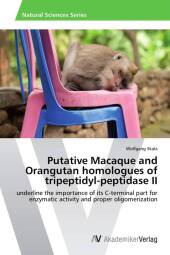 Neuerscheinungen 2013Stand: 2020-01-07 |
Schnellsuche
ISBN/Stichwort/Autor
|
Herderstraße 10
10625 Berlin
Tel.: 030 315 714 16
Fax 030 315 714 14
info@buchspektrum.de |

Wolfgang Skala
Putative Macaque and Orangutan homologues of tripeptidyl-peptidase II
underline the importance of its C-terminal part for enzymatic activity and proper oligomerization
2013. 184 S. 220 mm
Verlag/Jahr: AV AKADEMIKERVERLAG 2013
ISBN: 3-639-46765-5 (3639467655)
Neue ISBN: 978-3-639-46765-9 (9783639467659)
Preis und Lieferzeit: Bitte klicken
Tripeptidyl-peptidase II (TPP2) is a 138 150 kDa serine protease with a subtilisin-like N-terminal catalytic domain and an 800 residues long C-terminal extension. It releases tripeptides from the N-terminus of its substrates and has been implicated in various processes, e. g. general protein turnover and MHC I antigen processing. TPP2 has been observed in different oligomeric states, ranging from dimers up to tetracontamers. Intriguingly, its specific activity increases with oligomer size. Although oligomerization and oligomerization-dependent activity enhancement remain poorly understood, they likely involve the C-terminal part of TPP2. To validate this assumption, we investigated two shortened homologues of human TPP2: mTPP2 from M. fascicularis and oTPP2 from P. abelii lacked the complete C-terminal segment and about half of it, respectively. We partially succeeded in expressing tagged constructs of these putative enzymes in E. coli and in purifying them from bacterial cell lysates. Both proteins appeared highly polydisperse during analytical gel filtration and were inactive against a standard substrate. These findings suggest that mTPP2 and oTPP2 represent truncated variants of their respective full-length sequences, and that proper oligomerization requires a complete C-terminal part.
Wolfgang Skala received his bachelor´s and master´s degree in molecular biology from the Paris Lodron University of Salzburg and the Johannes Kepler University Linz. He is currently pursuing a PhD in structural biology at the University of Salzburg.


